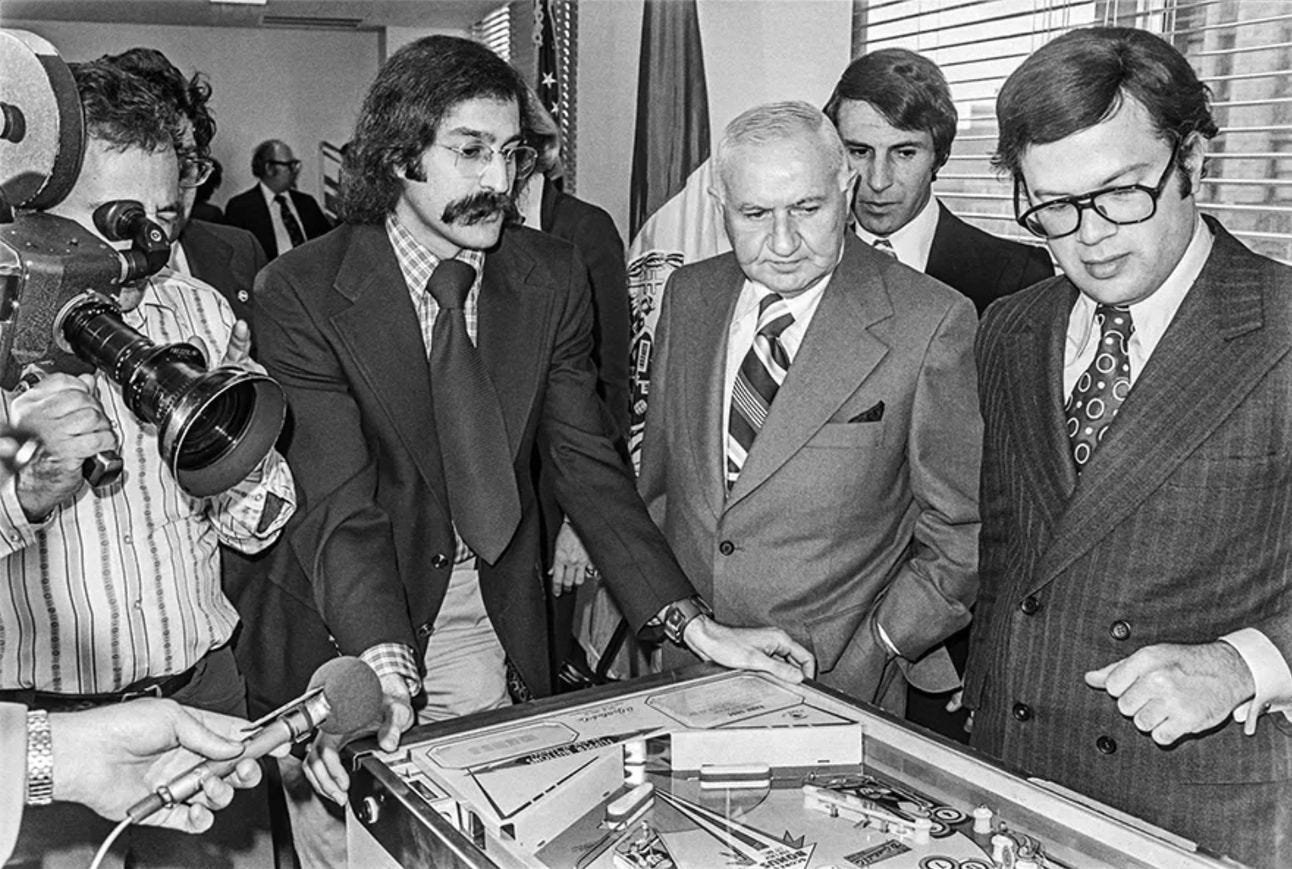Illegal Pinball
Overturning silly laws is a cause we all need to be involved in
I realized I could gain some level of control as a person. I could actually enjoy the act of playing pinball machines, [instead] of just being this insipid person who was just overwhelmed by it all.”
— Roger Sharpe
Pinball was illegal in New York City until 1976, when Roger Sharpe convinced the City Council that pinball was a game of skill, not chance. In 1948, Mayor Fiorello LaGuardia had banned pinball on the premise that it was a game of chance, appealing primarily to gamblers. The association with the mafia, who owned and operated many pinball machines, further tarnished its reputation.
However, in 1976, Sharpe challenged this perception by demonstrating his skill in a City Council meeting. He successfully called his shots on a pinball machine set up specifically for the occasion, impressing the otherwise skeptical councilors. His mastery over the game led to the overturning of the ban. Sharpe's tremendous mustache might have added to his memorable presentation!
More than just a demonstration of skill, Sharpe explained the cultural and psychological significance of pinball. Invented in the 1930s, pinball became popular during the Great Depression because it provided a sense of agency to many unemployed Americans. This insight aligns with sociologist Corey Keyes' recent book, Languishing: How to Feel Alive Again in a World that Wears Us Down. Keyes argues that the sense of agency is common to all great games. Beyond entertainment, pinball offers players a sense of accomplishment, requires them to develop a skill, and makes them feel like their actions matter.
Pinball, with its plunger, flippers, targets, and flashing lights, makes players feel like "a source of cause and effect in the world," according to Keyes. This raises the intriguing question: do games of skill fulfill an evolutionary need to be the protagonist of one’s own story?
Commentary: Why Overturning Silly Laws is Essential and How Law Evolves
The story of pinball's legalization in New York City underscores a vital civic lesson: overturning outdated or unreasonable laws is a crucial aspect of maintaining a just and progressive society. Citizens must actively engage in this process to ensure that laws reflect current values and knowledge.
Engagement and Advocacy: Sharpe’s advocacy demonstrates how individuals can influence legislation. By challenging misconceptions and presenting evidence, citizens can advocate for change. This is essential in a democracy where laws should serve the people’s best interests.
Law as an Evolving Entity: The legal system is not static; it evolves with society. What was deemed appropriate in one era may become outdated as societal norms and understanding advance. The ban on pinball, rooted in 1940s perceptions, became irrelevant by the 1970s as people recognized the skill involved and its positive psychological impact.
Addressing Misconceptions: Laws often stem from misconceptions or moral panics. Over time, as more information becomes available, it is necessary to reassess and correct these laws. Sharpe’s demonstration corrected the misconception that pinball was merely a game of chance, thereby promoting a more accurate understanding.
Psychological and Social Benefits: The benefits of games like pinball go beyond mere amusement. They contribute to psychological well-being by providing a sense of agency and accomplishment. Recognizing these benefits can influence how society perceives and regulates recreational activities.
In conclusion, the legalization of pinball in New York City is a prime example of how laws should evolve with time and understanding. It highlights the importance of citizen involvement in the legislative process and the need to continually reassess laws to ensure they serve the current societal context.


